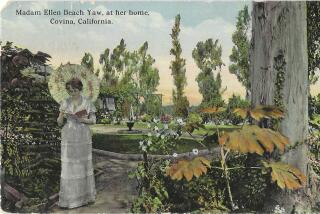Her Heart, Broken or Not, Belonged to Country
In some ways, it could be said that if you’ve heard one Tammy Wynette record, you’ve heard them all.
Unlike most of the other great singers of country music, Wynette, who died Monday at age 55 in Nashville, didn’t exhibit a lot of range in her work. She wasn’t a singer who pushed the boundaries of country music by reaching out for rock and soul material the way Emmylou Harris and Patsy Cline did. Neither did she infuse her music with the folksy commentary of Loretta Lynn or write with the detail of prime Dolly Parton.
Yet, Wynette stands as one of the half-dozen greatest female artists ever in country music because she did one thing to perfection.
From her earliest recordings through the ‘70s and ’80 hits that defined her style, Wynette sang heartbreak tales with just enough of a tear in her voice to make her seem like one of those artists for whom the honky-tonk jukebox was invented. On that narrow but marvelous playing field, no one could top her. And it was that forte that enabled Wynette to became an important pioneer in a musical field long dominated by men.
“Just follow the stairway to this lonely world of mine,” she sang in “Apartment #9,” which in 1966 became her first hit--and there was no denying that a star was born.
There were a few hit female singers in country music before Wynette, notably Kitty Wells and Loretta Lynn, but Cline was her only rival for expressing the barroom anguish of romantic disappointment with the emotional fire of men such as Hank Williams, Lefty Frizzell and George Jones.
Wynette not only made some records as classic as those male singers did, she ended up--briefly--married in the ‘70s to Jones in what was hailed as a true king and queen of country music pairing.
Wynette’s hits were produced and sometimes written by Billy Sherrill, who backed her with melodramatic arrangements and pushed her to the edge of parody at times because he knew the tension between the weeping steel guitar and the conviction of her vocal would somehow convey the essential sting of heartache and loss.
“Sometimes it’s hard to be a woman,” Wynette sang at the start of her signature hit, “Stand by Your Man,” the only of her country records to break into the pop Top 40. But none of her records reflected the Sherrill-Wynette approach better than her 1968 recording of Bobby Braddock and Curly Putman’s “D-I-V-O-R-C-E,” in which she sang about a couple that spells out “hurting words” because they want to shield their child from the bitterness of their breakup.
In 1967’s “I Don’t Wanna Play House,” written by Sherrill and Glenn Sutton, she told an equally poignant tale of a mother who hears her little girl tell a neighbor boy that she doesn’t want to play house because she too often sees her mommy and daddy fighting.
As the feminist movement challenged the sentiments of songs such as “Stand by Your Man,” Wynette’s themes were often downgraded as old-fashioned and subservient. But there is throughout her body of work the idealism of a woman who is reaching out for a better life. In the conservatism of country music, hers was a sometimes subtle but ultimate declaration of independence.
*
When Hillary Rodham Clinton said during the 1992 presidential campaign that she wasn’t supporting her husband blindly like “some little woman standing by my man like Tammy Wynette,” Wynette defended her song and herself vigorously--and got an apology from the future first lady.
For all her success, which included more than three dozen Top 40 country albums, Wynette remained a relatively private and humble person. She wasn’t comfortable in interviews, or a distinctive songwriter like Parton or Lynn, so she never enjoyed the media attention of either. Still, she leaves a legacy just as secure and influential.
Rolling Stone magazine gave her “Tammy’s Greatest Hits” album a maximum five-star review, and Keith Richards, who recorded “Apartment #9” during a break from the Rolling Stones in the ‘70s, once said Wynette was one of the reasons he fell in love with country music.
Though she played all sorts of venues during her career, from Las Vegas showrooms to international arenas, Wynette felt most at home in modest country music settings. “I’ve been singing all my life,” she said in a 1971 interview in Las Vegas. “I sang at home, at church, at social gatherings, wherever they would let me.
“But being from such a small place in Mississippi, I could never really envision getting to Nashville and becoming part of something as big as the Grand Ole Opry. That’s the big goal of every country singer. I’m honored when pop radio stations play my records, but I don’t ever want to be anything other than a country singer. That’s what I love.”
Wynette knew she always sounded best on a honky-tonk jukebox--and that’s where her spirit will remain.
* Cable’s Lifetime Television will rebroadcast “Intimate Portrait: Tammy Wynette,” tonight at 7. The one-hour program originally aired in 1997.
More to Read
The biggest entertainment stories
Get our big stories about Hollywood, film, television, music, arts, culture and more right in your inbox as soon as they publish.
You may occasionally receive promotional content from the Los Angeles Times.










